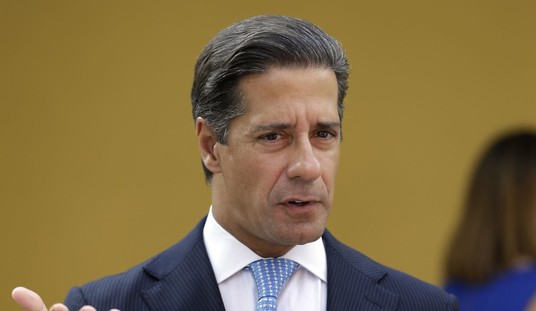Via Mediaite, skip to 3:30 below for the key bit. All fantasies of stopping Trump in the electoral college are goofy, but this one at least offers a reason beyond the usual variations of “I don’t like Trump.”
To refresh your memory, the Emoluments Clause prevents any federal officer from accepting “emoluments,” i.e. compensation for business services, from a foreign government without the consent of Congress. It doesn’t apply to business with private actors, which means many of Trump’s financial conflicts of interest are beyond the scope of the Clause. (Statutes related to bribery may pose a problem there, though.) But he does do business with some foreign governments — for instance, the state-owned Bank of China is a tenant in Trump Tower and a lender for a building in Manhattan in which Trump has a partnership interest. The big bucks flowing into the Trump International Hotel in Washington from diplomats eager to seek favor with the new president are also being provided by foreign governments. If he’s already in violation of the Emoluments Clause, argues former Bush ethics lawyer Richard Painter in the clip, why would the electoral college rubber-stamp his victory by voting for him next month? If Trump’s birth certificate showed that he wasn’t a natural-born citizen, wouldn’t the electoral college be obliged to block him in that case too?
Is it really the same, though? The natural-born requirement has to do with eligibility and affords no exceptions. The Emoluments Clause has to do with an officer’s behavior once he’s taken office (can Trump be in violation while he’s still a private citizen?) and it does carry an exception. It gives Congress the power to sanitize the president’s emoluments from foreign governments by formally approving them, which I’m sure is what Ryan and McConnell will do so long as Trump can show, kinda sorta, that a payment he received wasn’t far above what an arm’s-length transaction might have been expected to produce. (Painter himself suggests appointing an auditor to vet transactions on those grounds.) Meanwhile, Trump’s still in the process of figuring out how to deal with his various conflicts of interest. How could the electoral college decide on December 19th to block Trump from the presidency when he might (unlikely, but might) still be working at the time on a plan to divest from his businesses before taking the oath on January 20th?
And just to get technical, the vote of the electoral college isn’t final until the new Congress votes to certify the result on January 6th. If the electors revolted and handed the presidency to Hillary Clinton on the dubious legal theory that Trump is already in violation of the Emoluments Clause, how do you suppose the Republican-majority Senate and Republican-majority House would feel about certifying that result? If you’re looking for accountability on emoluments, your only legal option, I think, is to swear Trump in as president at the appointed hour and then hope that either (a) he comes to his senses and realizes the integrity of his presidency is worth more than his bank account or (b) Ryan and McConnell sack up and start thinking hard about impeachment if it becomes clear that he’s using his office to swing sweetheart deals from foreign governments for his businesses. If the public doesn’t care enough that Trump’s squeezing de facto bribes out of his business partners to force Congress to take action to remove him, nothing in the Constitution will restrain him. The Constitution is only as good as the civic culture of the people whose sovereignty it’s designed to protect.
If you’re in the market today for other desperate theories by which to deny Trump the presidency, read this new op-ed from law prof Lawrence Lessig. Lessig argues, novelly, that the electoral college should always make the national popular-vote winner president instead of the electoral-vote winner unless there’s some compelling reason, like evidence that he/she is manifestly unfit for office or committed fraud at the polls, not to do so. In other words, no electoral votes should be pledged, even presumptively, to any candidate; the electoral college would simply be a national body of 538 “wise men” who assemble for quality control, to make sure that the popular-vote winner is qualified for the job before approving his/her election. Imagine public reaction if a populist won the popular vote by 10 points nationally and was blocked by a small group of elitists — especially in an age of media saturation, when the supposedly “disqualifying” attributes of the winner had been well ventilated before Election Day. If Trump had won the popular vote, would Lessig’s electoral college be within its rights to block him over the “Access Hollywood” tape? If the public decided that wasn’t disqualifying, why should the wise men substitute their own judgment?
Whether or not you like that idea as a plan for the future, though, changing the rules now wouldn’t work for a reason that Trump himself has noted, namely, there’s no way to tell what the popular vote would have looked like if the two candidates had campaigned with winning that as their goal instead of winning the electoral college. If Trump knew that the popular-vote winner would become president, he would have spent lots of time in California, New York, Texas, and other populous states and ignored less populous purple states like Wisconsin. Handing Hillary the presidency because she won a game she wasn’t really trying to play would be like declaring after the Super Bowl that the team that scored the most touchdowns, not the most points, is the champion. If you want that system, change the rules beforehand. As it is, electors dumping Trump in favor of Clinton would almost qualify as a coup — until the Republican Congress inevitably blocked the attempt on January 6th, of course.








Join the conversation as a VIP Member